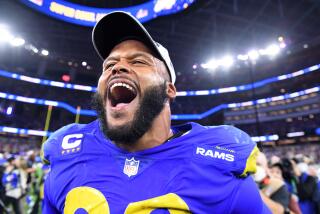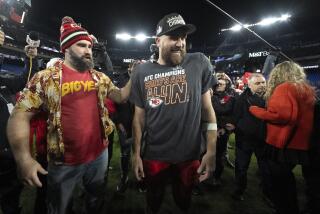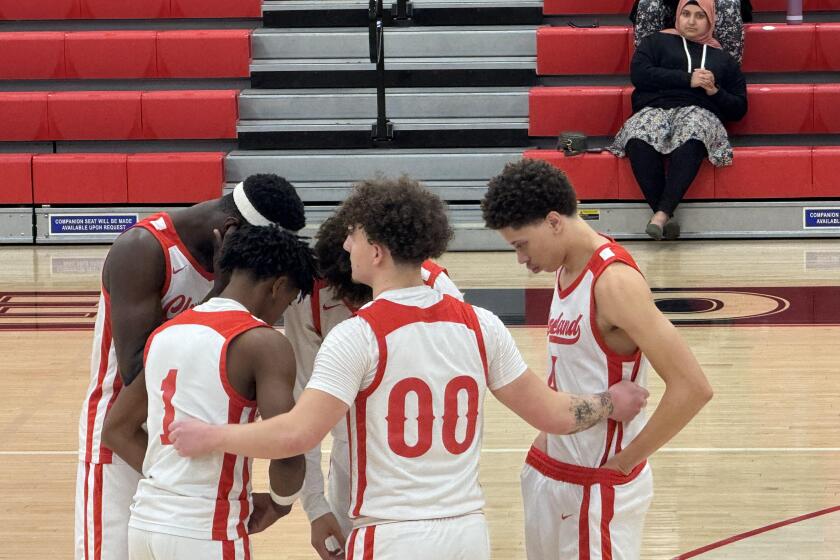Not all these guys feel super
- Share via
PHOENIX -- Eight o’clock on a desert morning, the rising sun casts an unsettling glow on the two deep, disparate shades of the NFL.
In one corner of town are the stars.
In the other corner are the scars.
Outside a flowery suburban resort, the New England Patriots are walking into tents with hundreds of reporters to talk about the Super Bowl.
Inside a sterile downtown convention center, four dozen NFL stars are limping into a half-empty ballroom to talk about what happens next.
At the same time the stars are waxing in their glory, the scars are murmuring in their pain.
Junior Seau talks about Sunday’s generally accepted truth.
“It’s a proud moment for the NFL,” he says.
Dave Pear, a retired defensive tackle, talks about Sunday’s proven consequences.
“I’ve been in constant pain for 25 years,” he says.
Tom Brady talks about the wonders of possibly going undefeated.
“We’re hoping to make it a truly memorable season for all of us,” he says.
Conrad Dobler, a retired offensive lineman, talks about how every Patriot has already lost.
“I was on the floor the other day and I couldn’t get up,” he says.
That these two news conferences occurred simultaneously was odd and uncomfortable.
It was also a far clearer statement about the state of NFL than Commissioner Roger Goodell can ever give.
Just because they’re dressed like Supermen doesn’t mean they aren’t human.
The single enduring constant of the NFL’s 85 years has not been punts, passes or kicks, but pain.
From their first hit to their last breath, the players are subject to untold agonies unseen in any other sport, and in few other professions.
The stars hide it with shots and pills and pride.
The scars remind us that they can’t hide it forever.
The stars support a union that often refuses to pay old-timers’ disability claims or raise their meager pensions.
The scars showed up this week to remind those stars that one day, the cane will be in the other hand.
“Everyone thinks they’re invincible,” said Richard Dent, former defensive tackle. “Look around, and you can see they’re not.”
Looking around the ballroom where the old-timers were gathered Thursday morning, things were easy to see, and difficult to watch.
It took them long minutes to walk to their chairs, one player on a motorized cart, another clanking a cane, most of them limping.
The reason for the gathering was even more awkward and sad.
Frustrated at their union’s support, the former players had formed a fund-raising group known as Gridiron Greats. The news conference was to promote an auction on gridirongreats.org that would help pay for things such as former players’ knee replacement surgeries.
The league makes billions off the violence of players, yet those players have to sell their autographs to pay for the damage?
Union chief Gene Upshaw makes $6.7 million a year -- more than triple any other sports union boss -- yet retired union workers have to beg the public to pay for a new ankle?
“There’s a dark secret out there,” said Carl Eller, former defensive end.
“But that secret is being let out of the bag.”
In the middle of the hourlong gathering, Pear suddenly stood up and wobbled around in front of his chair.
Turns out, the 54-year-old former Tampa Bay Buccaneer and Oakland Raider can’t stand or sit for more than 20 minutes at a time.
He played only six years, yet he has had seven spinal surgeries, a hip replacement, and so much concussion residue that he falls asleep during the day and often fights off vertigo.
He used to be able to bench press 500 pounds. Now he can bench 15.
His career ended at 27 in 1981 because of a herniated disk in his back when the Raiders released him after he helped them win a Super Bowl, and eventually called owner Al Davis for medical help.
“He still hasn’t called me back,” Pear said.
During that time he has flooded the league with inquiries about disability insurance, but has been essentially told the same thing.
Seven spinal surgeries doesn’t mean you’re disabled.
The league disability plan routinely denies players whose disabilities occur after their playing days, even if it was a result of a playing injury.
“People don’t understand,” Pear said.
Upshaw, who once threatened to break former player Joe DeLamielleure’s neck if he kept complaining, said that the union is doing its best.
“Never once have I turned my back on a retired player,” Upshaw said at his annual news conference Thursday. “I fight for retired players and I fight for present players. I fight for future players.”
Those present and future players never put any pressure on Upshaw to help the retired guys.
The stars never realize they will one day be scars.
“All these guys in the league now, they don’t understand, it could be them sitting on our side one day,” Michael Irvin said.
Some do. Kyle Turley, an offensive lineman with the Kansas City Chiefs this season, donated a $25,000 game check to the old-timers, and pushed for others to contribute. But he barely came up with $25 a player.
“Until those players realize they could be in the same boat, nothing is going to happen,” Turley said.
The plight of former players is a dark secret indeed, a fact unwittingly highlighted by Upshaw when he bragged about a new union plan to help players suffering from various forms of dementia.
He said that, of the nearly 9,000 former players, he had received 80 applications for help.
That would put the rate of dementia in the NFL at about six times the national average.
Said Upshaw: “I wouldn’t agree that we, as football players, are suffering at a higher rate than the general public.”
Countered Dobler: “Every day I wake up, I wonder what else I’m going to lose.”
Out in the suburbs, the stars ended their Thursday media session with hope.
“I’m very excited, it’s going to be a lot of fun, we’re going to be ready to go this Sunday,” the Patriots’ Wes Welker said.
Back downtown, the scars ended it with resignation.
“You playing golf?” someone asked Dobler as he hobbled toward a sunny mid-morning sky.
“Not anymore,” he said.
--
Bill Plaschke can be reached at [email protected]. To read previous columns by Plaschke, go to latimes.com/plaschke.
More to Read
Go beyond the scoreboard
Get the latest on L.A.'s teams in the daily Sports Report newsletter.
You may occasionally receive promotional content from the Los Angeles Times.











